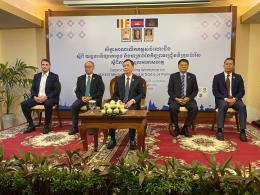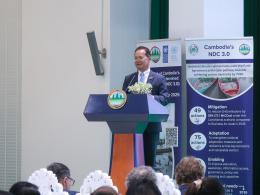The Ministry of Environment in collaboration with the UNFCCC hold National Adaptation Plans (NAP) Writing Workshop for Least Developed Countries Expert Groups (LEGs)
The Ministry of Environment, in collaboration with the Secretariat of the UN Framework Convention on Climate Change (UNFCCC), held a four-day (July 12-15) training workshop on National Adaptation Plans (NAP) Writing Workshop for Least Developed Countries Expert Groups (LEGs) from in Siem Reap. The workshops built on the work of the LEG initiated in 2019 through the Open NAP initiative, a series of virtual NAP country dialogues held in 2020–2021 and virtual events held in August–September with aim to provide hands-on technical assistance to the LDCs for developing adaptation project concept notes for eventual submission to the GCF and to support the LDCs in developing or updating their NAP road maps for 2022 and the medium term.
At the opening session, H.E. Tin Ponlok, Secretary of State of the Ministry of Environment, stated that Cambodia is one of the most vulnerable to the impacts of climate change, and adaptation activities play an important role in reducing climate change vulnerabilities and contributing to improving people’s livelihoods. He mentioned that Cambodia has included 13 green and climate activities into its post-Covid 19 development and economic recovery strategy. He also added that the important outcomes of the 26th Summit of the UN Climate Change Conference (COP26), including the prioritization of adaptation activities and funds mobilization from developed countries to the LDCs. He stressed out that the LDCs develop more concepts in order to turn the funding support commitments into actual action via the technical and budget assistance promised.
Mr. Paul Desanker, representative of the UNFCCC, wanted to thank the government of Cambodian, and in particular the Ministry of Environment, for co-organizing this important workshop. He stressed out that the UNFCCC supports Cambodia and other least developed countries in developing adaptive action plans and related tool and approaches to improve people’s livelihoods and respond to climate change.
The four-day workshop discussed the state of NAPs, including the share of experiences from the representatives on project proposal development, identification of adaptation priorities for a project design in order to receive funding from Green Climate Fund, as well as other funds. The workshop also discussed the NAP implementation, knowledge and appropriate technology transfer for the implementation of adaptation activities of the LEDs highlighting the progress of adaptation activities, challenges, policies, and best practices from the LEDs in responding to climate change.



